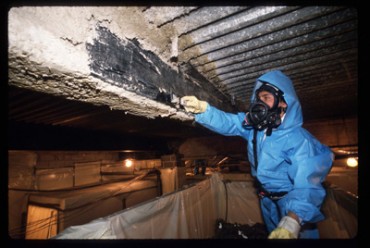
John Bleasby
Asbestos Removal Part One: A Quebec contractor who took it in-house, the right way
Canadian ContractorNeil Damackine's company, Construction ND, is one of the few in Quebec who are fully trained to perform their own asbestos removval
Neil Damackine runs his Montreal-area company, Construction ND, to a high standard, and that has led to a rare departure in the residential renovation business. He’s gone in-house with hazardous material remediation, particularly asbestos.
“I’ve always tried to educate myself by taking courses to distinguish my company from others,” Damackine told Canadian Contractor. “About four or five years ago, I decided it was time to increase my knowledge about the remediation of hazardous materials. So I took a very good course about asbestos management.”
Attitudes towards asbestos had been casual for too long
Damackine describes how, for many years, tying a scarf around the face or wearing a paper mask was considered acceptable protection when dealing with tiles and insulation found in older buildings under renovation. Long term health concerns were only starting to be discussed and any adherence to regulations was somewhat lax. “I tried to be careful but I did what I did because I didn’t know any better. No one knew any better. Even today, too many people are unaware of the health risks associated with improper removal. ”

Bringing asbestos remediation in-house has meant training and special equipment for Construction ND, but it has been worth it.
The asbestos management course changed all that, almost like an epiphany. “It was an eye opening experience for me,” he explains. “And it shook me because I realized for years I had been placed in situations where, through ignorance, I had contaminated myself. I said to myself never, ever, ever again.”
Three good reasons to go in-house
Construction ND is one of the few renovation companies in Quebec that conduct their own remediation. One reason is philosophical, Damackine said: “I value my employees and I value my customers. Bringing the process in-house gives me control over the quality of remediation. I’m 100 per cent confident of the work I’m doing.”
The other reasons are financial, Damackine observed: “There is a lot of money involved in remediation. It’s difficult to leave that money on the table by subbing (it) out when I have the mindset to do that type of work properly.” And, of course, by offering this additional service, Construction ND has a competitive advantage when it comes to project proposals.
“Remediation is a lot more than just throwing up some tarps and wearing funny looking suits,” Damackine continued. “The costs of doing proper remediation are high, and the bill at the end of the day pretty much tells you the quality of job that was done.”
The challenge of finding the right training
None of this was an easy process for Damackine. At first, he struggled through a maze of circular pathways, trying to develop in-house protocols and certified documentation. Some private training courses cost $1,000 per head for one or two days of instruction. “That simply isn’t financially viable. Some of my workers are long-term but many are from a pool of workers I call on.”
As a result, Damackine felt frustrated and wondered if the asbestos remediation situation in his area of Quebec was nothing more than a cash grab. He also noted that numerous agencies overseeing hazardous material remediation are focused on commercial or new house construction, not renovations. Lower cost courses are available only for those with CCQ cards (Quebec Construction Commission), which most of Neil’s residential renovation workers are not required to hold.
This left few options for Damackine. “I said damn the torpedoes; I’m going ahead and creating my own course! I went into the regulations, found all the subjects that needed to be covered, and I compiled them into an 8-hour course which I now give to any new or casual employee before they enter any site where there will be asbestos.”
Damackine is confident about the quality of his training
“I believe I can demonstrate to any one that I am following all the regulations. All of our remediation work is verified by a third party IEP (Interior Environmental Professional). I am required by law to carry an in-house remediation protocol, also created by a certified IEP. Every time I go on a job, that protocol is validated. We do air quality tests at the beginning, each day, and at the end of each job.
Despite the bureaucracy, the costs of training, and of suiting up his employees for protection, is Damackibe still happy with his decision to go in-house with remediation? “Yes! I wouldn’t have it any other way!”
follow John on Twitter 
@john_bleasby
Advertisement
Print this page

I been working on the asbestos field for over28 years in the USA. As a supervisor project manager estimated Trying to move to Canada is there work for supervisor any openings.